‘Circle Mirror Transformation’ will leave you stirred and disturbed long after the final bows
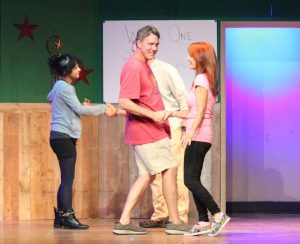 On stage in the Joan Jenks Auditorium at Golden Gate Community Center now through December 13 is The Studio Players’ production of Annie Baker’s Circle Mirror Transformation. The two-act play chronicles the emotional journey traversed by the instructor and five students who take part in a six-week adult creative drama workshop at a community center in the fictional town of Shirley, Vermont.
On stage in the Joan Jenks Auditorium at Golden Gate Community Center now through December 13 is The Studio Players’ production of Annie Baker’s Circle Mirror Transformation. The two-act play chronicles the emotional journey traversed by the instructor and five students who take part in a six-week adult creative drama workshop at a community center in the fictional town of Shirley, Vermont.
The instructor  is a middle-aged flower child by the name of Marty (Hollis Galman) who’s more into spirit catchers and exercises designed to prompt her students to get in touch with and release their emotions than script analysis, scene work and method acting, much to the chagrin of her youngest student, Lauren (Rosie DeLeon), a shy sixteen-year-old who signed up for the course to gain a
is a middle-aged flower child by the name of Marty (Hollis Galman) who’s more into spirit catchers and exercises designed to prompt her students to get in touch with and release their emotions than script analysis, scene work and method acting, much to the chagrin of her youngest student, Lauren (Rosie DeLeon), a shy sixteen-year-old who signed up for the course to gain a 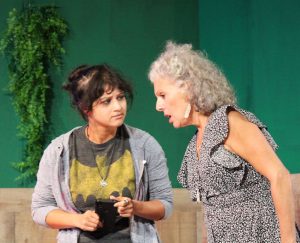 competitive edge in landing the plumb role of Maria in her high school drama club’s impending production of West Side Story.
competitive edge in landing the plumb role of Maria in her high school drama club’s impending production of West Side Story.
Joining Lauren in the workshop is a former actor by the name of Theresa (Gerrie Benzing), who recently left New York and the theater to become a massage therapist, and a lonely, recently-divorced carpenter by the name of Schultz (Tom Rex) who senses that life is about to pass him by. Rounding out the class is 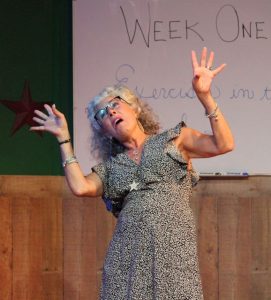 Marty’s husband, James (Les Williams/Greg Wojciechowski), a progressive professor who allowed himself to get talked into participating because his wife needed another body in the class.
Marty’s husband, James (Les Williams/Greg Wojciechowski), a progressive professor who allowed himself to get talked into participating because his wife needed another body in the class.
Each of these characters with the exception of Lauren has been deeply scarred by their prior experiences as both children and adults. But we don’t discover the nature or depth of their psychic injuries and emotional disabilities from the characters themselves. Rather, their ghosts and skeletons emerge indirectly from descriptions the characters provide of one another and the stories and off-hand 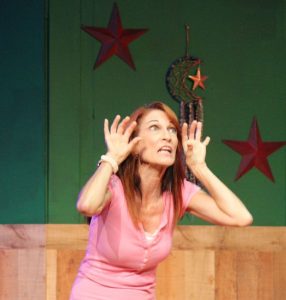 comments they make during and in the aftermath of the exercises Marty puts them through.
comments they make during and in the aftermath of the exercises Marty puts them through.
Since the times of the Greeks, acting instructors have developed various techniques to help actors learn and hone their craft. The Stanislavski System, for example, encourages actors to draw upon their own feelings and experiences in aid of conveying the essence and projecting themselves into the mindset of the character they are portraying. Lee Strasberg taught actors how to use their own experiences to develop such an emotional and cognitive understanding of their role 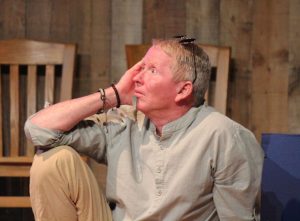 that it enables them to identify with and become one with their character. And Michael Chekhov developed a technique in which transformation, and working with impulse, imagination and inner and outer gesture enables actors to use parts of themselves to transcend the small, banal moments that comprise their daily existence to access parts of their unconscious where universal archetypical
that it enables them to identify with and become one with their character. And Michael Chekhov developed a technique in which transformation, and working with impulse, imagination and inner and outer gesture enables actors to use parts of themselves to transcend the small, banal moments that comprise their daily existence to access parts of their unconscious where universal archetypical 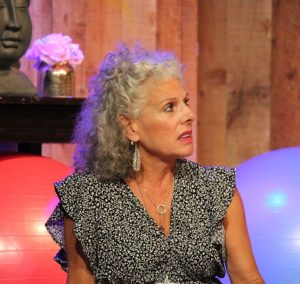 images and iconography dwell.
images and iconography dwell.
But in the course of exploring themselves through these kinds of exercises and tools, Marty and her creative drama workshop students are not only constrained to divulge their carefully-concealed vulnerabilities, they are compelled to confront, painfully at times, what’s lacking in their relationships and in their lives.
Neither you nor I would ever willingly put ourselves in situations 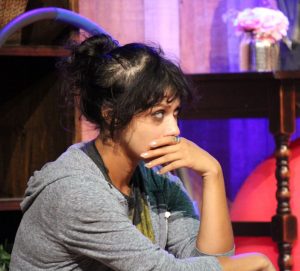 that force us to put the worst side of ourselves on public display. But actors, good actors, routinely make this very trade-off. And perhaps nowhere is that truer in Circle Mirror Transformation than in an early scene in which Gerrie Benzing’s character, Theresa, tells a tone-deaf story replete with anti-Semitic and racial tropes that go well beyond making everyone in the class and the audience at large uncomfortable and ill at ease.
that force us to put the worst side of ourselves on public display. But actors, good actors, routinely make this very trade-off. And perhaps nowhere is that truer in Circle Mirror Transformation than in an early scene in which Gerrie Benzing’s character, Theresa, tells a tone-deaf story replete with anti-Semitic and racial tropes that go well beyond making everyone in the class and the audience at large uncomfortable and ill at ease.
“It’s innocent ignorance,” 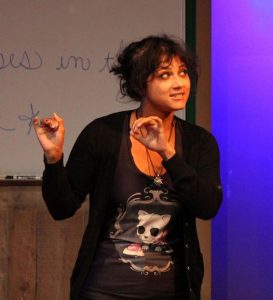 offers Director Scott Lilly. “Theresa is ignorant of the fact that [the tropes and slurs] are offensive.” But Gerrie Benzing does. Yet she has to stand in front of her fellow actors and the audience and deliver mortifyingly awkward comments she’d never dream of saying in real life. [This is not the time or place to embark upon a discussion of ignorance versus racism in America. The distinction does exist, but I’ll let African American Champlain College student Nyjah Strange make that case.]
offers Director Scott Lilly. “Theresa is ignorant of the fact that [the tropes and slurs] are offensive.” But Gerrie Benzing does. Yet she has to stand in front of her fellow actors and the audience and deliver mortifyingly awkward comments she’d never dream of saying in real life. [This is not the time or place to embark upon a discussion of ignorance versus racism in America. The distinction does exist, but I’ll let African American Champlain College student Nyjah Strange make that case.]
And then there’s the break-up that Benzing and Tom Rex are called 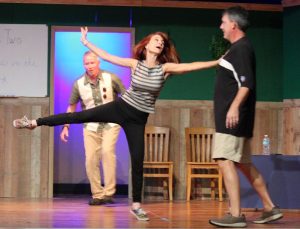 upon to act out beginning with Act Two.
upon to act out beginning with Act Two.
Both of their characters had recently gone through horrible break-ups before enrolling in Marty’s workshop, and as the exercises rip the bandage off their festering wounds, they find themselves drawn to each other like magnets to iron shavings. But then Theresa suddenly decides that she’s either not ready to jump into another 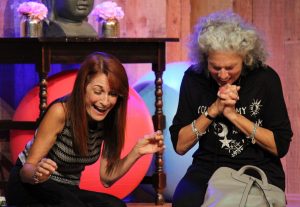 relationship or that she was simply looking for validation of her desirability, but nothing more. And in the aftermath of Theresa rejection, Benzing and Rex must conjure and replicate brutally raw emotions for the rest of the play.
relationship or that she was simply looking for validation of her desirability, but nothing more. And in the aftermath of Theresa rejection, Benzing and Rex must conjure and replicate brutally raw emotions for the rest of the play.
High schools don’t offer a course in how to effect or weather a break-up. Perhaps they should. And the audience isn’t privy to the 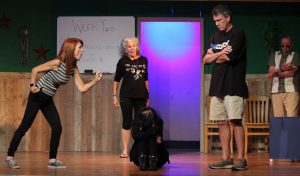 real life break-ups that Benzing and Rex have experienced in their lives. But we’ve all suffered losses and how we react to what we witness on stage undoubtedly depends on our deeply personal experiences. The men in the audience no doubt view Theresa as an egocentric bitch who dropped poor Schultz like yesterday’s garbage.
real life break-ups that Benzing and Rex have experienced in their lives. But we’ve all suffered losses and how we react to what we witness on stage undoubtedly depends on our deeply personal experiences. The men in the audience no doubt view Theresa as an egocentric bitch who dropped poor Schultz like yesterday’s garbage. 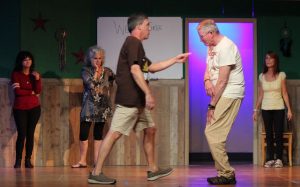 Female audience members are likely to see in Schultz that nightmare ex-boyfriend who just won’t let go or, worse, who seeks to extract revenge whether through social media or other means.
Female audience members are likely to see in Schultz that nightmare ex-boyfriend who just won’t let go or, worse, who seeks to extract revenge whether through social media or other means.
By keeping it raw and exposed for all to see and dissect, Benzing and Rex function as mirrors, reflecting back to the audience 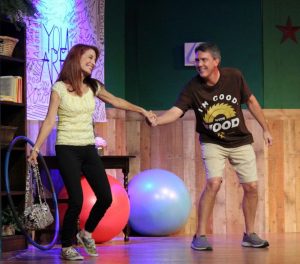 what we’ve done and how we’ve been treated upon the dissolution of our own romantic relationships.
what we’ve done and how we’ve been treated upon the dissolution of our own romantic relationships.
The point is that Circle Mirror Transformation is the ideal show for those of you who are fans not just of psychological drama, but theater that plumbs the inner lives of the characters we see interacting on stage. Annie Baker provides a thought-provoking script that places a heavy emphasis on character development and revelation. Baker drives that  point home by including the audience in the play’s final theater exercise.
point home by including the audience in the play’s final theater exercise.
In the next to last scene, Marty asks each of her students to jot on a slip of scratch paper a personal secret they’ve never shared with anyone. She joins in the exercise as well. Then she collects the slips and places them in a bag before having James, Schultz, Theresa and Lauren draw them in turn from the bag and read them aloud. Think you know these characters from the exercises you’ve just watched them go through? Think you know who they are based on what the characters have said about themselves and each other? Well, then you’ll have no trouble linking each of these secrets to the character who wrote them down.
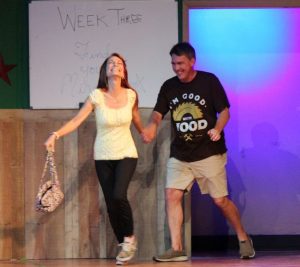 But then again, you just might be in for the surprise of your life. For if Circle Mirror Transformation teaches anything it’s that you learn the most from listening not just with your ears, but with your eyes and your heart as well.
But then again, you just might be in for the surprise of your life. For if Circle Mirror Transformation teaches anything it’s that you learn the most from listening not just with your ears, but with your eyes and your heart as well.
Circle Mirror Transformation is as well-directed and finely-acted a show as you can hope to find. While Annie Baker may not be in the same league as Tennessee Williams (although she did snag a Pulitzer for one of her other plays), Circle Mirror Transformation is as good and 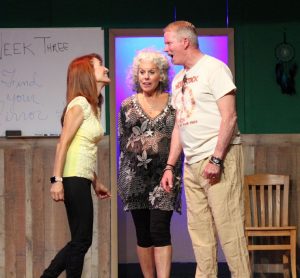 tight of a show as Studio Players’ production of Cat on a Hot Tin Roof. Hollis Galman as Marty, Les Williams as James and Rosie DeLeon as Lauren give strong, emotionally-evocative performances. And Tom Rex is marvelous and memorable in the role of Theresa’s cast-aside ex-boyfriend, Schultz.
tight of a show as Studio Players’ production of Cat on a Hot Tin Roof. Hollis Galman as Marty, Les Williams as James and Rosie DeLeon as Lauren give strong, emotionally-evocative performances. And Tom Rex is marvelous and memorable in the role of Theresa’s cast-aside ex-boyfriend, Schultz.
As for Gerrie Benzing, her portrayal of Theresa is nothing short of stunning.
“She’s been wanting to do [a role] like this for a long time – to show  her acting chops to everyone,” says Director Scott Lilly who, interestingly, had never seen her perform prior to her audition for the role.
her acting chops to everyone,” says Director Scott Lilly who, interestingly, had never seen her perform prior to her audition for the role.
Benzing was excellent as Bernice Hodes (the lead) in Zalman Velvel’s DMV for Lab Theater. She was equally arresting in a supporting role in The Full Monty for New Phoenix. But those performances seem amateur (they weren’t) by comparison. Theresa is a complicated, problematic and, at times, downright unsympathetic character who must be played with a circumspect obtuseness (as opposed to mere cluelessness) in order for the audience to 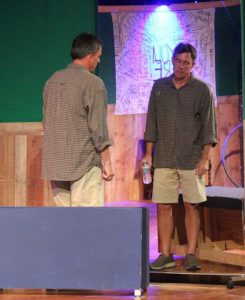 connect with her. Benzing doesn’t just accomplish that objective. Through Lilly’s direction and the assist of her cast mates, she transforms Theresa into a catalyst for the emotional fractures suffered by all of the other characters – except for Lauren, who’s more bemused than disturbed by Theresa’s persona and antics. It’s Benzing’s best performance by far.
connect with her. Benzing doesn’t just accomplish that objective. Through Lilly’s direction and the assist of her cast mates, she transforms Theresa into a catalyst for the emotional fractures suffered by all of the other characters – except for Lauren, who’s more bemused than disturbed by Theresa’s persona and antics. It’s Benzing’s best performance by far.
The Studio Players and Golden Gate Community Center have gone to extreme measures to make Circle Mirror Transformation as safe and secure from COVID as possible. Of course, everyone has to make their own calculations as to the level of risk they’re willing to chance 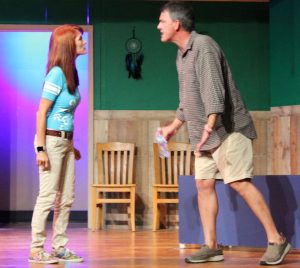 given the pandemic. But this is one of those shows that is worth venturing from home to see. Not because it’s entertaining theater. But because it’s the type of theatrical experience that will leave you stirred and disturbed long after the final bows.
given the pandemic. But this is one of those shows that is worth venturing from home to see. Not because it’s entertaining theater. But because it’s the type of theatrical experience that will leave you stirred and disturbed long after the final bows.
November 28, 2020.














 Tom Hall is both an amateur artist and aspiring novelist who writes art quest thrillers. He is in the final stages of completing his debut novel titled "Art Detective," a story that fictionalizes the discovery of the fabled billion-dollar Impressionist collection of Parisian art dealer Josse Bernheim-Jeune, thought by many to have perished during World War II when the collection's hiding place, Castle de Rastignac in southern France, was destroyed by the Wehrmacht in reprisal for attacks made by members of the Resistance operating in the area. A former tax attorney, Tom holds a bachelor's degree as well as both a juris doctorate and masters of laws in taxation from the University of Florida. Tom lives in Estero, Florida with his fiancee, Connie, and their four cats.
Tom Hall is both an amateur artist and aspiring novelist who writes art quest thrillers. He is in the final stages of completing his debut novel titled "Art Detective," a story that fictionalizes the discovery of the fabled billion-dollar Impressionist collection of Parisian art dealer Josse Bernheim-Jeune, thought by many to have perished during World War II when the collection's hiding place, Castle de Rastignac in southern France, was destroyed by the Wehrmacht in reprisal for attacks made by members of the Resistance operating in the area. A former tax attorney, Tom holds a bachelor's degree as well as both a juris doctorate and masters of laws in taxation from the University of Florida. Tom lives in Estero, Florida with his fiancee, Connie, and their four cats.